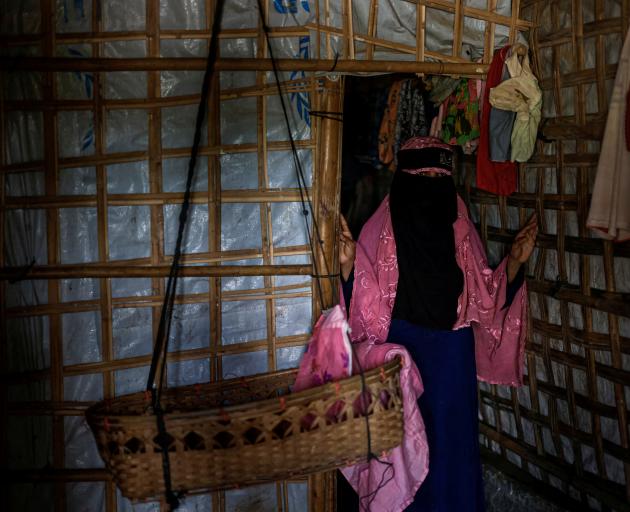Politics
Rohingya Refugee Schools Shut, Leaving Children Without Education

The closure of schools for Rohingya refugee children in Bangladesh has left over 227,500 students without education, exacerbating an already dire humanitarian crisis. As international aid dwindles, families in Cox’s Bazar face increasing challenges, jeopardizing the futures of a generation of children who have already experienced significant trauma.
In the Cox’s Bazar refugee camps, many parents express deep concern about the lack of educational opportunities for their children. Begum, a mother of five, shared her worries as her 16-year-old daughter faces the risk of early marriage. “Without school, girls sit idle. People start talking,” she noted. Her husband is struggling with mental health issues, and she fears for her daughter’s future, hoping her husband will allow her to continue studying.
Around 1.2 million Rohingya Muslim refugees currently reside in Bangladesh, with approximately half being children. Most fled a brutal military crackdown in Myanmar, described by United Nations investigators as a “textbook example of ethnic cleansing.” This week marks the eighth anniversary of the mass displacement that saw over 700,000 Rohingya cross into Bangladesh in a matter of days, creating the world’s largest refugee settlement.
Funding cuts from international sources are compounding these issues. Under the administration of former President Donald Trump, the U.S. significantly reduced its international aid contributions. The United Nations High Commissioner for Refugees (UNHCR) requires about $256 million to support the Rohingya this year, the lowest amount sought in six years. Yet, only about 38% of that total has been pledged.
According to Juliette Murekeyisoni, interim UNHCR Representative in Bangladesh, the funding crisis poses a serious threat to essential services for the Rohingya population. “This community has already lost everything and is now facing a severe funding shortfall that threatens their survival,” she stated. Critical assistance for basic needs, including food, health services, and education, is at risk of collapse.
The United Nations Children’s Fund (UNICEF) has also reported significant disruptions in education services. In June, the organization suspended operations at more than 4,500 schools, impacting over 227,500 Rohingya children and nearly 1,200 Bangladeshi teachers. Although classes resumed in July for older students, many schools remain deserted, leaving children to play in the mud instead of learning.
The International Rescue Committee (IRC) reveals that no Rohingya child under the age of 12 has access to education in Cox’s Bazar. The IRC estimates that as many as 500,000 children are now missing out on learning opportunities. As a direct consequence, reported cases of child marriage have increased by 3%, and child labor by 7% this year.
“Each day, more families will continue to turn to extreme methods of survival,” warned Hasina Rahman, IRC’s Bangladesh director. The lack of education is leading to increased vulnerability for children, with many families resorting to desperate measures such as gambling and selling children into marriage.
UNICEF attributes the funding decline to “shifting global priorities.” Rana Flowers, UNICEF Representative to Bangladesh, acknowledged the immense challenges faced, stating, “To stretch every dollar, we have reduced UNICEF staff, streamlined programmes, and cut costs wherever possible – but the needs far outweigh the resources available.”
The ongoing violence in Myanmar has added to the strain, as up to 150,000 Rohingya have arrived in Cox’s Bazar over the past 18 months, further intensifying the demand for already limited resources. Teachers like Kafayat Ullah lament the loss of educational opportunities for their students. “I dreamed my students would become doctors or engineers. Now, with no classes, they will become nothing,” he remarked.
As the plight of Rohingya children continues, dreams for a better future are fading. Nine-year-old Nahima Bibi expressed her sadness about missing school. “If I don’t go to school, how will I ever become a doctor?” she asked. “My heart feels sad.” The current situation poses a critical challenge not only for the Rohingya community but also for the world, as the future of these children hangs in the balance.
-

 World1 week ago
World1 week agoPrivate Funeral Held for Dean Field and His Three Children
-

 Top Stories2 weeks ago
Top Stories2 weeks agoFuneral Planned for Field Siblings After Tragic House Fire
-

 Sports3 months ago
Sports3 months agoNetball New Zealand Stands Down Dame Noeline Taurua for Series
-

 Entertainment3 months ago
Entertainment3 months agoTributes Pour In for Lachlan Rofe, Reality Star, Dead at 47
-

 Entertainment2 months ago
Entertainment2 months agoNew ‘Maverick’ Chaser Joins Beat the Chasers Season Finale
-

 Sports3 months ago
Sports3 months agoSilver Ferns Legend Laura Langman Criticizes Team’s Attitude
-

 Sports4 weeks ago
Sports4 weeks agoEli Katoa Rushed to Hospital After Sideline Incident During Match
-

 World2 weeks ago
World2 weeks agoInvestigation Underway in Tragic Sanson House Fire Involving Family
-

 Politics2 months ago
Politics2 months agoNetball NZ Calls for Respect Amid Dame Taurua’s Standoff
-

 Top Stories2 weeks ago
Top Stories2 weeks agoShock and Grief Follow Tragic Family Deaths in New Zealand
-

 Entertainment3 months ago
Entertainment3 months agoKhloe Kardashian Embraces Innovative Stem Cell Therapy in Mexico
-

 World4 months ago
World4 months agoPolice Arrest Multiple Individuals During Funeral for Zain Taikato-Fox





















